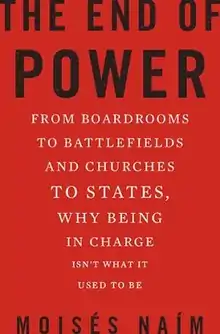The End of Power
The End of Power: From Boardrooms to Battlefields and Churches to States, Why Being in Charge Isn't What It Used to Be, written by Moisés Naím, discusses the decline of power in established leaders and institutions.[1][2]
 First edition | |
| Author | Moisés Naím |
|---|---|
| Country | United States |
| Language | English |
| Subject | Economics, politics |
| Genre | Non-fiction |
| Publisher | Basic Books |
Publication date | March 13, 2013 |
| Media type | |
| Pages | 306 pp. |
| ISBN | 978-0465037810 |
Summary
The book's overall theme points out while it is becoming easier to get power, it is also becoming harder to use it to control others and harder to keep it once you have it.[3]
Naim suggests that globalization, economic growth, a growing global middle class, the spread of democracy, and rapidly expanding telecommunications technologies have changed our world.[4][5] He says these developments have created a fluid and unpredictable environment which has unsettled the traditional dominions of power.[6]
Reception
On January 2, 2015, Mark Zuckerberg selected The End of Power as his inaugural pick for his "Year of Books" challenge for the Mark Zuckerberg book club, a public resolution to read one new book every two weeks in 2015.[7][8][9] Washington Post wrote, “It’s not just that power shifts from one country to another, from one political party to another, from one business model to another, Naim argues; it’s this: 'Power is decaying.'”[10] Forbes called the book the “ankle-biter economy.”[11] The End of Power was also listed for the Financial Times and McKinsey Business Book of the Year.[12]
References
- Loofbourow, Lili (2015-01-15). "The End of Power by Moises Naím review – a study in mass alienation". the Guardian. Retrieved 2016-07-06.
- "The End of Power". Foreign Affairs. 2013-02-11. Retrieved 2016-07-06.
- THE END OF POWER by Moiss Nam | Kirkus Reviews.
- "It ain't what it used to be". The Economist. ISSN 0013-0613. Retrieved 2016-07-06.
- "Book Review: The End of Power: From Boardrooms to Battlefields and Churches to States, Why Being In Charge Isn't What It Used to Be by Moisés Naím". 2013-03-23. Retrieved 2016-07-06.
- "The rule of more - FT.com". Retrieved 2016-07-06.
- Alexandra Alter. "When Mark Zuckerberg Likes a Book, Sales Soar - NYTimes.com". Retrieved 2016-07-06.
- "Four Questions for...Moises Naim". Retrieved 2016-07-06.
- Lo, Danica. "Everything You Need to Know: 5 Most-Highlighted Passages From *The End of Power*". Retrieved 2016-07-06.
- Goldstein, Gordon M. (2013-03-08). "'The End of Power From Boardrooms to Battlefields and Churches to States, Why Being In Charge Isn't What It Used' by Moises Naim". The Washington Post. ISSN 0190-8286. Retrieved 2016-07-06.
- Maney, Dave. "Book Review: 'The End of Power'". Retrieved 2016-07-06.
- Graphics, FT Interactive. "The End of Power by Moises Naim". Retrieved 2016-07-06.